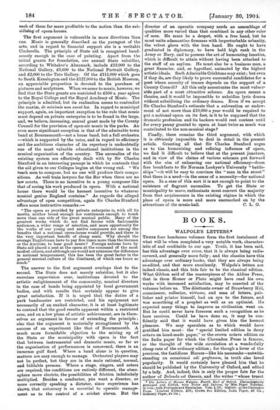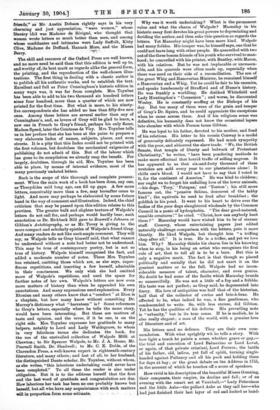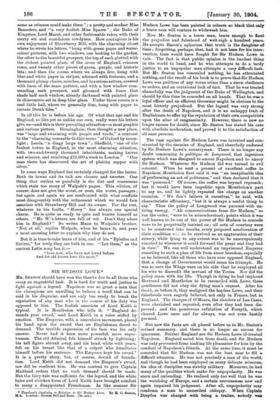BOOKS.
WALPOLE'S LETTERS.*
THESE four handsome volumes form the first instalment of what will be when completed a very notable work, character- istic of and creditable to our age. Truth, it has been said, has this advantage over error, that it is always being redis- covered, and generally more fully; and the classics have this advantage over ordinary books, that they are always being re-edited, and that more excellently. Walpole's letters are indeed classic, and this bids fair to be the classical edition. What Gibbon said of the masterpieces of the Aldine Press, that in them Homer or Plato might have read his own works with incressed satisfaction, may be asserted of the volumes before us. The dilettante owner of Strawberry Hill, connoisseur, collector, virtuoso, and man of letters, pub- lisher and printer himself, had an eye to the future, and was something of a prophet as well as an optimist. He expected many things to improve as civilisation went on. But he could never have foreseen such a recognition as he here receives. Could he have done so, it may be con- fidently said that it would have given him the keenest pleasure. We may speculate as to which would have gratified him most : the "special limited edition in dem', octavo on hand-made paper," or the crown octavo edition on the India paper for which the Clarendon Press is famous, or the thought of the wide circulation at a wonderfully cheap rate of the ordinary edition ; for though a lover of the precious. the fastidious Horace—like his namesake—notwith- standing an occasional profanum, in truth also loved popularity. It would certainly have pleased him that he should be published by the University of Oxford, and edited by a lady. And, indeed, this is only the proper fate for the author of Delenda eat Ozonia, and the writer "whose truest . • The Letters of Horace Walpole Fourth Earl of Orford. Chronologically Arranged and Edited, with Notes and Indices, by Mrs. Paget Toynbee. le rota., eith Portraits and Facsimiles. Vol.. L-iy. Word.: at the ClarendOn Press. 11,nnited Edition, £16; Crown Sve Edition, India Paper, £6 18s.; Ordinary Paper, £4 les.1
friends," as Mr. Austin Dobson rightly says in his very charming and just appreciation, "were women," whose literary idol was Madame de Sevigne, who thought that women wrote letters so much better than men, and among whose confidantes and intimates were Lady Suffolk, Kitty Clive, Madame du Deffand, Hannah More, and the Misses Berry.
The skill skill and resource of the Oxford Press are well known, and no more need be said than that this edition is well up to, and worthy of, its best mark as regards alike the general form, the printing, and the reproduction of the well-chosen illus- trations. The first thing in dealing with a classic author is to publish all his authentic works, and to establish the text. Excellent and full as Peter Cunningham's historic edition in many ways was, it was far from complete. Mrs. Toynbee has been able to add to his two thousand six hundred letters some four hundred, more than a quarter of which are now printed for the first time. But what is more, to his ninety- five correspondents she has added no less than fifty-five new ones. Among these letters are several earlier than any of Cunningham's, and, as lovers of Gray will be glad to learn, a new one in French to Gray's friend, perhaps his only flame, Madam Speed, later the Comtesse de Viry. Mrs. Toynbee tells us in her preface that she has been at the pains to prepare a very elaborate Index of names, subjects, places, and even streets. It is a pity that this Index could not be printed with the first volumes, but doubtless the mechanical exigencies of publishing do not admit of this. But of the labour which has gone to its compilation we already reap the benefit. For largely, doubtless, through its aid, Mrs. Toynbee has been able to place, by means of internal evidence, most of the many previously undated letters.
Such is the scope of this thorough and complete present- ment. When the main work of a book has been done, any one, as Thucydides said long ago, can fill up gaps. A few more letters, conceivably more than a few, may hereafter come to light. And more may perhaps be elaborated by some future hand in the way of comment and illustration. Indeed, the chief criticism that may be passed upon this edition relates to this province. The greater bulk and slighter texture of Walpole's letters do not call for, and perhaps would hardly bear, such annotation as Dr. Birkbeck Hill gave to Boswell's Johnson or Gibbon's Autobiography, or as Mr. Tovey is giving to the more compact and scholarly epistles of Walpole's friend Gray. And many readers do not like such ample comment. They will say, as Walpole tells us Gray himself said, that what cannot be understood without a note had better not be understood. This may be true of contemporary poetry, but is not so true of history. Walpole himself recognised the fact, and added a moderate number of notes. These Mrs. Toynbee has retained, omitting those which are, as she says, super- fluous repetitions, and inserting a few herself, admirable in their conciseness. We only wish she had omitted more of Walpole's repetitions, and used the space for further notes of her own. Walpole's letters are now even more matters of history than when he appended his own annotations. And many expressions need explanation. Every Etonian and many others know that a " conduct " at Eton is a chaplain, but how many know without consulting Dr. Murray's dictionary what " harrateen" is ? Some references to Gray's letters, especially where he tells the same story, would have been interesting. But these are matters of taste and opinion, and the error, if it be one, is on the right side. Mrs. Toynbee expresses her gratitude to many helpers, notably to Lord and Lady Waldegrave, to whom in very felicitous terms she dedicates the book, for the use of the unrivalled collection of Walpole MSS. at Chewton ; to Sir Spencer Walpole, to Mr. J. A. Home, Mr. Pearsall Smith, Dr. Shadwell ; to Mr. C. E. Doble, of the Clarendon Press, a well-known expert in eighteenth-century literature, and many others; and last of all, to her husband, the distinguished Dante scholar, Dr. Toynbee, without whom, as she writes, "this laborious undertaking could never have been completed." To all these the reader is also under obligation. But it is to the editress herself that the first and the last word of gratitude and congratulation are due. How laborious her task has been no one probably knows but herself, but all who.have any acquaintance with such matters will in proportion form some estimate.
Why was it worth undertaking? What is the permanent value and what the charm of Walpole? Macaulay in his historic essay first devotes his great powers to depreciating and deriding the author, and then asks this question as regards the letters. Yet Macaulay might have been more kind. Walpole had many foibles. His temper was, he himself says, one that he could not leave long with other people. He quarrelled with two out of the three bosom friends of his youth who survived to man- hood ; he quarrelled with his printer, with Bentley, with Mason, with his relatives. But be was not implacable or unreason- able, and his, quarrels were often made up, especially when there was need on their side of a reconciliation. The son of the great Whig and Hanoverian Minister, he remained himself a Hanoverian and a Whig. Yet he could be fair to his enemies, and speaks handsomely of Strafford and of Hume's history. He was frankly a worldling. He disliked Whitefield and Lady Huntingdon's " Connexion" ; and worse, he discounted Wesley. He is constantly scoffing at the Bishops of his day. But too many of them were of the grain and temper of Gray's Dr. Squire, and he could appreciate the exceptions when he came across them. And if his religious sense was defective, his humanity does not know the occasional lapses into slumber with which Porson taxes Gibbon.
He was loyal to his father, devoted to his mother, and fond of his relations. His letter to his cousin Conway is a model of generosity delicately expressed. He had much sympathy with the poor, and abhorred the slave trade. "We, the British Senate, that temple of liberty and bulwark of Protestant Christianity," he writes, "have been pondering methods to make more effectual that horrid traffic of selling negroes. : It has appeared to us that six-and-forty thousand of these wretches are sold every year to our plantations alone ! It chills one's blood. I would not have to say that I voted in it, for the continent of America." He was kind to children ; nor ought we to forget his unfailing love of the lower animals, —his dogs, 'Tory,'. Patapan,' and ' Tonton ' ; his still more famous cat, the "pensive Selitua, demurest of the tabby kind"; the squirrels be used to feed after breakfast ; the goldfish in his pond. It went to his heart to drive over the bodies of the poor dogs slaughtered wholesale by the Common Council in a panic of hydrophobia. "The dear good-natured, sensible creatures !" he cried. "Christ, how can anybody hurt them ?" Macaulay would have wished him to be of sterner stuff. Creevey, whose entertaining papers just edited naturally challenge comparison with the letters, puts it more bluntly. He liked Walpole, but thought him "a trifling chap after alL" It is true. He is a trifler, and yet we love him. Why ? Macaulay thinks his charm lies in his knowing when to stop, in his being an artist who recognises the first rule of art, that to tell all is to be a bore. But this is only a negative merit. The fact is that though so placed politically and socially that he did not exert it on the greatest matters or to the full, Walpole had no incon- siderable measure of talent, character, and even genius. No doubt he had some of the faults which Macaulay brands so unmercifully. He was not a little of a fop and a fribble. His taste was not perfect; as Gray said, he degenerated into finery. His love of antiquities was half that of the historian, half that of the collector of curios and bric-a-brac. He affected to be, what indeed he was, a fine gentleman, who condescended to write. So, with less excuse, did Gibbon. Yet he has the qualities of his defects. His prevailing note is "urbanity," but in its true sense. If he is modish, he is also really elegant ; a man of the world, with a genuine love of literature and of art.
His letters need no defence. They are their own com- mendation. With what sprightly wit he tells a story. With how light a touch he paints a scene, whether grave or gay,— the trial and execution of Lord Bahnerino or Lord Lovat, or again, of that private criminal, Lord Ferrets; the battle of his father, old, infirm, yet full of spirit, turning single- handed against Pulteney and all his pack and holding them for days at bay ; or the great debate on the Address in 1755, in the account of which he touches off a score of speakers.
How vivid is his description of the beautiful Misses Gunning, their conquests, their empire, its decline and fall ; or of an evening with the smart .set at Vauxhall,—" Lady Petersham and the little Ashe—the pollard Ashe as they call her—whe had just finished their last layer of red and looked as hand. some as crimson could make them " ; a pretty and modest Miss Beauelerc, and "a very foolish Miss Sparre " ; the Duke of Kingston, Lord Marsh, and other fashionable rakes, with their merry wit and scandalous rowdyism. How contagious is his own enjoyment of Strawberry Hill, with the charming closet where he wrote his letters," hung with green paper and water- colour pictures, with two windows, one looking to the garden, the other to the beautiful prospect, the top of each glutted with the richest painted glass, of the arms of England, crimson roses, and twenty other pieces of green, purple, and historic bits ; and then the rooms where we always live, hung with blue and white paper in stripes, adorned with festoons, and a thousand plump chairs, couches, and luxurious settees, covered with linen of the same pattern, and with a bow window com- manding each prospect, and gloomed with limes that shade half each window, already darkened with painted glass in chiaroscuro set in deep blue glass. Under these rooms is a cool little hall, where we generally dine, hung with paper to imitate Dutch tiles."
In all this he is before his age. Of what that age and his England, so like yet so unlike our own, really were his letters give us—and this is their prevailing attraction—a most graphic, and various picture. Birmingham, then thought a new place, was "large and swarming with people and trade," a contrast to the "charming venerable Gothic scene" of Oxford by moon- light ; Leeds, "a dingy large town" ; Sheffield, "one of the foulest towns in England, in the most charming situation, with two-and-twenty thousand inhabitants, making knives and scissors, and remitting £11,000 a week to London." "One man there has discovered the art of plating copper with silver."
In some ways England has certainly changed for the better. Both its towns and its talk are cleaner and sweeter. One thing that strikes us painfully is the dirt and coarseness which stain too many of Walpole's pages. This edition, of course, does not give the worst, or even the worse, passages ; but again and again we are confronted with what conflicts most disagreeably with the refinement which we would fain associate with Strawberry Hill and its owner. For the rest, whatever be his faults, " lorry " has always one special charm. He is quite as ready to quiz and banter himself as others. "Mr. W.'s letters are full of wit. Don't they adore him in England P " So writes Mann to Walpole's brother. "Not at all," replies Walpole, when he hears it, and pens a most amusing letter to explain why they do not.
But it is time to take leave of him, and of his "Epistles and Satires," for truly they are both in one. "Let them," as the ancient Latin song has it,—
" love now, who have not loved before
And let old lovers love the more."
























































 Previous page
Previous page